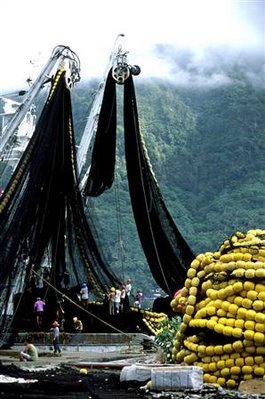
Kindly note the humans in comparison to the size of these nets. Marine life of any kind doesn't have a chance. I would like to know how many Marine Mammals are caught in these nets, die and are simply tossed back to the ocean to sink out of sight without accountability.
Experts attribute overfishing to the industrialization of boats like this one, which uses huge nets to catch tuna.
November 14, 2006
Troubled Seas
One report after another over the last decade has documented the degradation of the world's oceans and predicted a catastrophic decline in important fish species. But in terms of sheer gloom none compares to a recent study in the journal Science. It asserts that the progressive unraveling of entire marine ecosystems up and down the food chain could lead to the ''collapse'' of all commercial species, possibly by the middle of this century.
The researchers -- well-known marine scientists from Canada and four other countries -- reached their conclusion after analyzing dozens of ecosystems around the world, 48 marine protected areas, and 53 years worth of fishing data provided by the United Nations. They found that by 2003 -- the last year for which data on commercial fish catches was available -- 29 percent of all species now being fished had collapsed from overfishing, habitat loss or pollution.
The study defined collapse as a 90 percent decline from estimated historical highs.
The study builds upon previous studies in three important respects. Earlier work had documented a 90 percent decline in a few commercially important species like cod, tuna and swordfish; the new study includes many more species. Second, the study provides elaboration of how entire ecosystems fall apart, with the decline of one species triggering the decline of another. Third, it puts the day of reckoning right around the corner -- 2048, to be precise. ''Our children will see a world without seafood if we don't change things,'' said the lead author, Boris Worm of Dalhousie University in Nova Scotia.
The study says that the situation is not hopeless, but only if the world moves quickly to reduce overfishing and other threats. Two opportunities for change lie immediately at hand. One is a proposal now before the United Nations that would end unregulated bottom trawling on the high seas. Bottom trawling -- essentially the strip-mining of the ocean floor by heavily subsidized foreign fleets -- is incredibly destructive. The United Nations banned fishing with huge drift nets years ago; it should do the same with bottom trawling now.
The second is the pending reauthorization of the Magnuson-Stevens Act regulating fishing practices in U.S. waters. The Senate has approved a bill that strengthens the act in important ways. It should be an early order of business for the new Congress.
